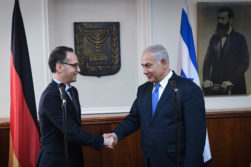Iran was a key topic as Israeli Prime Minister Benjamin Netanyahu hosted two of the most influential diplomats in Europe on Monday, with time running out to fix the Iran nuclear deal before United States President Donald Trump pulls his country out of the accord. Trump had set a four month deadline to upgrade the arrangement in January, leaving Europe roughly six weeks to make the required changes. It was certainly a top-of-mind talking point for Netanyahu.
“The foremost terrorist-sponsoring regime in the world, in our region and beyond is Iran. We have to roll back its aggression, and it is vast, and we must ensure that Iran does not acquire nuclear weapons,” Netanyahu told French Foreign Minister Jean-Yves Le Drian in comments from his office. “I think this is the preeminent issue facing the international community in the coming months, in the coming years.”
Netanyahu also met with German Foreign Minister Heiko Maas—just weeks after he was named Berlin’s top diplomat—and the Iranian nuclear deal was on the agenda. And even if the two nations don’t always agree, Haas made it clear they remain friends.
“Perhaps there is a difference regarding the way to achieve this or that goal but Germany’s place has always been at Israel’s side and I make this clear in every conversation,” said Haas in an Israeli press release on his comments with Netanyahu. “We are friends and as friends we can disagree on various issues such as the Vienna Agreement on the Iranian nuclear issue and two states for to peoples, there as well our views differ, but first and foremost we are friends. We want to hear from our friends their concerns and fears, and therefore I have come here.”
Netanyahu also called Haas a friend and made it clear that Iran’s nuclear ambitions are a worthy concern.
“We have a turbulent region. Israel is the only liberal democracy in a very large radius, and as such we share common values and common interests, but we share those interests with many in the region—that is to prevent the nuclearization of Iran, to prevent, to stop the flow of Iran aggression, which is like a tsunami in our region, and of course to fight terrorism,” said Netanyahu according to the press release.
One day prior to Netanyahu’s remarks on Iran, chief of the Israeli Military Intelligence Directorate Maj. Gen Herzi Halevi highlighted the multi-faceted threat of Iran in a Jerusalem conference. The IDF Spokesperson live tweeted comments from the speech, including Halevi’s assertion that Iran is using Syrian territory with “the hidden intention of dominating the Middle East.”
Halevi also noted a key problem with the Iran nuclear accord. “Since the signing of the nuclear agreement, Iran has more boldly launched rockets and incited acts or terror,” Halevi was quoted by the IDF Spokesperson Twitter Feed as saying.
Beyond Iran, Netanyahu also noted to the Germans that Israel assists in the battle with terrorism—including against ISIS—and also appreciates “the contributions of Germany to Israel’s security, which means to Israel’s future.”
In his comments with the French Foreign Minister, Netanyahu expressed his condolences for the recent terror attack in Toulouse, France.
“We have to stand together against this terrorism that afflicts our world,” said the Israeli premier. “We have to fight terrorists wherever they are. And we have to fight terror-sponsoring regimes wherever they are.”
(By Joshua Spurlock, www.themideastupdate.com, March 26, 2018)

